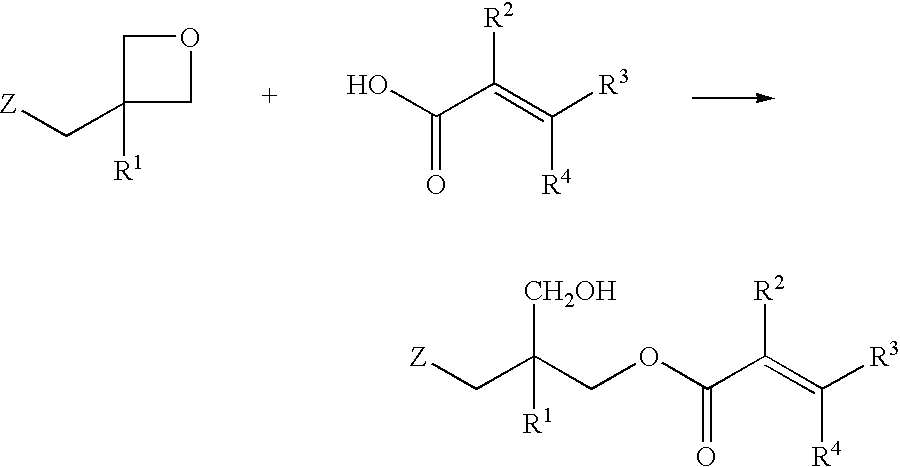Unsaturated monocarboxylic ester compound, process for producing the same, and composition curable with actinic energy ray
a monocarboxylic ester compound and unsaturated monocarboxylic ester technology, applied in the preparation of carboxylic acid esters, chemistry apparatus and processes, etc., can solve the problems of inferior adhesiveness of the composition containing this compound to various substrates, and achieve the desired properties of the cured product only with difficulty
- Summary
- Abstract
- Description
- Claims
- Application Information
AI Technical Summary
Benefits of technology
Problems solved by technology
Method used
Image
Examples
example 1
[0062] In a 30 ml flask made of glass, 3.62 g (10 millimols) of terephthalate bisoxetane, 3.44 g (40.0 millimols) of methacrylic acid, 0.42 g (1.0 millimol) of tetraphenylphosphonium bromide, 0.01 g of methoquinone, and 5 ml of xylene were charged and stirred with a magnet stirrer to left reacting for 24 hours at 130.degree. C. After completion of the reaction, 50 ml of toluene and 40 ml of a 10% sodium carbonate aqueous solution were added to the mixture, the organic layer was removed by using a separatory funnel, and the organic layer was washed with water twice. After anhydrous sodium sulfate was added to the obtained organic layer, it was dried. Then, after the organic solvent was removed by distillation under vacuum, 5.6 g of thin brown viscous liquid was obtained. As a result of the HPLC analysis, it has been confirmed that the degree of conversion was 93%. By the measurement of IR spectrum of the product, the decrease in absorption caused by the oxetanyl group at 980 cm.sup.-...
example 2
[0063] The synthesis was carried out by following the procedure of Example 1 mentioned above, except that 2.84 g (40.0 millimols) of acrylic acid was used in place of methacrylic acid. As a result of the reaction, 4.7 g of brown viscous liquid was obtained and the degree of conversion was 91%. In the measurement of IR spectrum of the product, the decrease in absorption caused by the oxetanyl group at 980 cm.sup.-1 was found. Therefore, it has been confirmed that the addition reaction proceeded properly and the compound aimed at was produced.
example 3
[0064] In a 200 ml flask made of glass, 36.2 g (0.1 mol) of terephthalate bisoxetane, 17.2 g (0.2 mol) of methacrylic acid, 2.64 g (5.0 millimols) of tetraphenylphosphonium bromide, and 0.2 g of methoquinone were charged and stirred for 24 hours at 130.degree. C. without using a solvent. The reaction product exhibited an acid value of 23.7 mg KOH / g and the rate of addition reaction was 85%. The hydroxyl value of the product was 141 mg KOH / g.
PUM
| Property | Measurement | Unit |
|---|---|---|
| reaction temperature | aaaaa | aaaaa |
| reaction temperature | aaaaa | aaaaa |
| reaction temperature | aaaaa | aaaaa |
Abstract
Description
Claims
Application Information
 Login to View More
Login to View More - R&D
- Intellectual Property
- Life Sciences
- Materials
- Tech Scout
- Unparalleled Data Quality
- Higher Quality Content
- 60% Fewer Hallucinations
Browse by: Latest US Patents, China's latest patents, Technical Efficacy Thesaurus, Application Domain, Technology Topic, Popular Technical Reports.
© 2025 PatSnap. All rights reserved.Legal|Privacy policy|Modern Slavery Act Transparency Statement|Sitemap|About US| Contact US: help@patsnap.com



